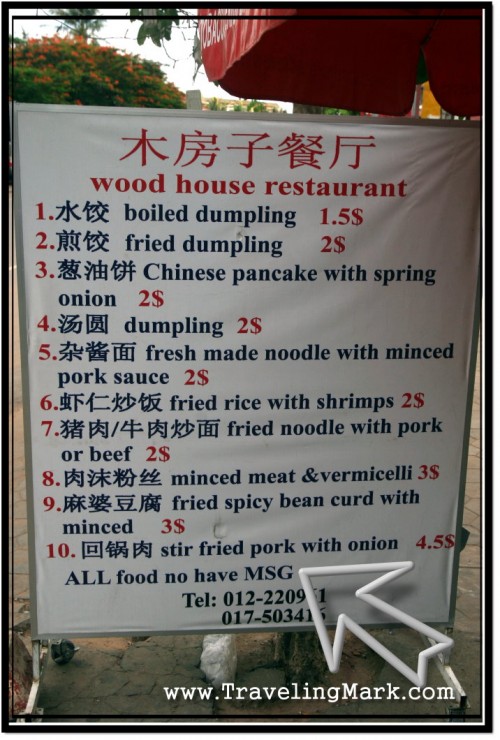Even though excessive amounts of MSG (Monosodium Glutamate) added to the food I was eating with the villagers from Sras Srang during the last day of the Pchum Ben Festival made it taste awful so I didn’t have much of it, I still had enough to cause further stomach problems. At this point I had enough pointers to start being apprehensive about MSG and went on the internet to read up on it.
As with many other things, the information available on the internet is rather conflicting. Some said intake of MSG was harmful, while others stated they experienced no problems whatsoever, even after years of use. It was hard to come to a solid conclusion based on other people’s reports, but potentially harmful side effects caught my attention so I started to ask around in restaurants whether they could cook the food for me without MSG.
Eating MSG Free Foods
Harmful or not, I didn’t feel like eating too much food that had its taste enhanced with chemical seasoning. In my mind, the premise was simple – I’d ask a waiter in a restaurant if it was possible to cook the dish I’d order without any MSG. I said I didn’t care if the cook thought it didn’t taste right without MSG, but I made it a requirement if they wanted to get my business. I made it clear that it didn’t matter to me what they believed each dish needed in order to taste right, or what they’d continue serving to other customers, but as for me… you either ensure there is no MSG in my food, or I will never dine in your establishment again.
Unfortunately, Khmer Family Restaurant was unable to accommodate my requests. I used to dine there a lot but since I couldn’t get anyone to take my requests seriously, I quit going there. Luckily, there is no shortage of restaurants anywhere a guy goes and many will be more than happy to oblige in order to earn your business so this was not an issue. Amazingly enough, after I started asking for no MSG in my food, the stomach problems went away.
Habit of Asking for No MSG
Since I already know what the food with loads of MSG smells and tastes like, I could often tell whether what I was served had the taste “enhanced” with it, or not. However this is not always possible as small amounts of it won’t have much impact on taste. It’s like with salt – if you overdo it, you can tell the dish is too salty, but if you put just right amount, then it simply tastes just right.
There were a few occasions when I forgot to ask for no MSG and I found out about it the following day when the stomach cramps came back. Since I was supporting the establishments that were happy to accommodate my requests for no MSG in my food, after a few regular visits I no longer needed to remind them of how to cook for me. But that threw me off the habit of asking for no MSG each time I was ordering food and failed to do it with a few restaurants in which I hadn’t dined before.
Why Such Sensitivity to MSG?
I attribute my initial sensitivity to MSG to clean digestive system. My diet consisted of at least 80% organic food when I was in Canada. Everything that could be had in 100% organic form was a staple of my diet with the rest consisting of either organic, or if not available, then natural foods. Not everything could be had organic, but majority of my diet was chemistry free (except from occasional fast food munchies) so my digestion was nice and clean.
But then when I came to Cambodia and started bombarding my stomach with excessive MSG, the impact was instantly noticeable. I appreciate that people who eat foods full of pesticide all the time have their digestion used to the chemicals and may not feel the negative effects of MSG so harshly. That’s perhaps how one could explain the conflicting reports on MSG intake on the internet.
MSG Free Dining
From my own experience, MSG is definitely bad for your health and has a very negative effect on your body. Elimination of MSG from my diet resulted in elimination of stomach problems I was experiencing while eating foods that contained MSG. But seeing how more and more restaurants with signs that none of their foods contain MSG keep popping out all over Asia, I’m guessing I’m not the only one who experienced similar problems with MSG and that resulted in growing demand for MSG free dining.
